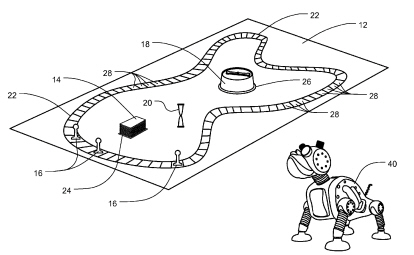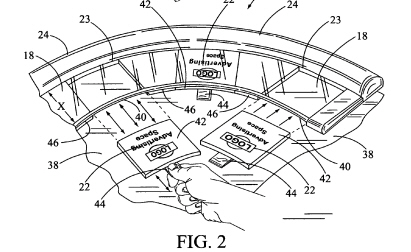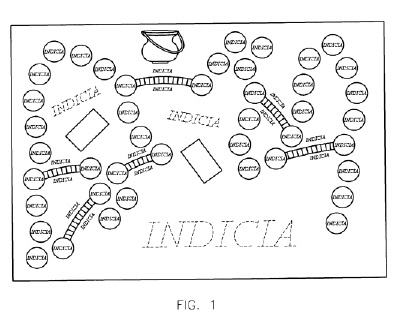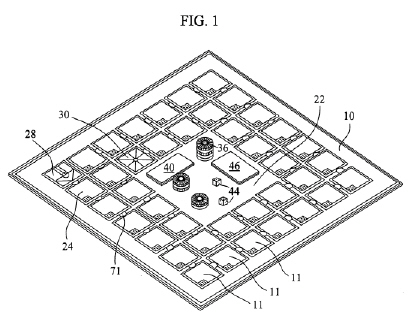Welcome to Purple Pawn, covering games played around the world by billions of people every day.
January Board and Card Game Patents
01 Feb
Posted by Yehuda Berlinger as Card Games, Electronic Games, Modern Board Games
Game having shredder for operation by children – I’m in favor of any children’s game that comes with sharp steel blades.
The theme is The Dog That Ate Your Homework. You place a picture into the dog’s mouth, the picture gets shredded, and you remove the pieces from the mouth. The patent helpfully adds, “Of course, other routings may be substituted as desired and using appropriate guides and the like to help move the card through the paper shredder and out.” The mind boggles.
Then you try to guess what the picture was, or reassemble it, as fast you can.

I’m seeing this game as having limited replayability.
Big box office “The Movie Business Game” – A roll-and-move board game with lots of rolling.
Playing card wagering game and method therefor – A simple gambling card game with two wagers, one of which can be withdrawn after seeing one of the dealer’s cards.
Card game tabletop with advertising – Yes, it is for this that the patent system was created: To promote the Progress of Science and useful Arts, by securing for limited Times to Authors and Inventors the exclusive Right to their respective Writings and Discoveries.

Vocabulary board game – A design patent:

I’m pretty sure the final game won’t be called “Indicia”.
Apparatus and method for a race game wherein competitors apply defensive strategies and math skills to win – A roll and move game, with chips, cards, traps, and math questions.

Wagering settlement method for casino games – This patent gives a nice summary of the Player/Dealer method of betting, which is what happens when each player takes a turn being dealer (in places where straight dealer vs player gambling is forbidden), and its problems. The patent then gives some sort of alternate suggested for how to handle Player/Dealer betting, but I couldn’t see how it solves the problems.
Device for holding and viewing playing cards – Many other devices have been created to assist physically disabled people to play cards, which the patent acknowledges. However, “None of the prior art particularly describes an apparatus and method for displaying and viewing playing cards in a novel, box-like mirrored assembly that can be placed on a horizontal surface and provides a secure means for viewing said playing cards.” Ah.
Poker style card game and method of play – You know a patent is going to be good when it starts off with a history lesson:
The exact origins of poker-style games is a matter of opinion with cards games from Germany (Pochen), France (Poque), Persia (As Nas), India (Ganjifa), and China (card variation of dominoes) all contending for possible parenthood of poker. Modern poker in America most probably started in New Orleans and traveled up the Mississippi, being played on steamboats. The game quickly spread to the interior of the country on the wagon trains. The Civil War brought about variations in the game such as “stud” poker. In the early 20th century, “draw” poker rose to prominence.
And, after describing dozens of regularly played poker games, the patent justifies its expensive monopoly as follows:
None of these games teaches a poker style game in which the player concurrently constructs a five card hand and a three card hand from four initially dealt cards.
Thank god for patents. Each player is dealt four cards, and, if he doesn’t already have a good hand, the player splits the cards into two Texas Hold’em hands.
Playing cards with dual number feature – There have been many, many other decks of cards where each card features two different values, to which the patent dutifully admit. The difference in this case is that all the number combinations add up to 11.
Financial trading game – Not a board or card game, but I couldn’t resist. It’s a gambling device that simulates a stock market. So, after you’ve lost most of your money in the stock market, you can relax by losing the rest of it gambling at a machine that simulates a stock market.
No Comments
Sorry, the comment form is closed at this time.
Trending
- Massdrop.com
- Oh the Irony—Illuminati Card Game Continues to Inspire Conspiracy Theorists
- Footprints, an Educational Ecology Game
- USPS Adds Board Game Flat Rate Box
- Home
- Baila, the Estonian Drinking Card Game
- Crystal Caste Wins Dice Patent Suit Against Hasbro
- Hasbro and Mattel Merger?
- Are Board Games Dangerous?
- Board Games Based on Hindu Mythology
Archives
Most Popular Articles
- Oh the Irony—Illuminati Card Game Continues to Inspire Conspiracy Theorists
- The 20 Most Valuable Vintage Board Games
- The Truth About Dominoes On Sunday in Alabama
- Sequence Game, and Variants
- USPS Adds Board Game Flat Rate Box
- Baila, the Estonian Drinking Card Game
- The 13 Most Popular Dice Games
- Are Board Games Dangerous?
- Guess Who? The Naked Version
- What Happened to the Jewel Royale Chess Set?
Recent Posts
- Toy Fair 2019—Breaking Games
- Talisman Kingdom Hearts Edition
- Toy Fair 2019—Winning Moves
- Toy Fair 2019—Games Workshop
- Toy Fair 2019—Star Wars Lightsaber Academy
- Toy Fair 2019—Stranger Things Games
- Toy Fair 2019—HABA
- Licensing Roundup
- Game Bandit
- 2018 A Difficult Year For Hasbro But Not For D&D Or MtG
Recent Comments
- on Toy Fair 2019—Winning Moves
- on Game Bandit
- on Second Look—Dungeons & Dragons Waterdeep Dragon Heist
- on Crowdfunding Highlights
- on Beyblade SlingShock
- on Game Bandit
- on Game Bandit
- on Watch This Game!, the Board Game Review Board Game
- on Second Look—Vampire: The Masquerade 5th Edition
- on Palladium Books Loses Robotech IP License, Cancels Five-Year-Overdue Robotech RPG Tactics Kickstarter




